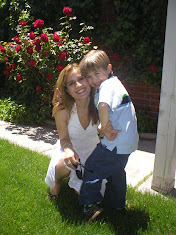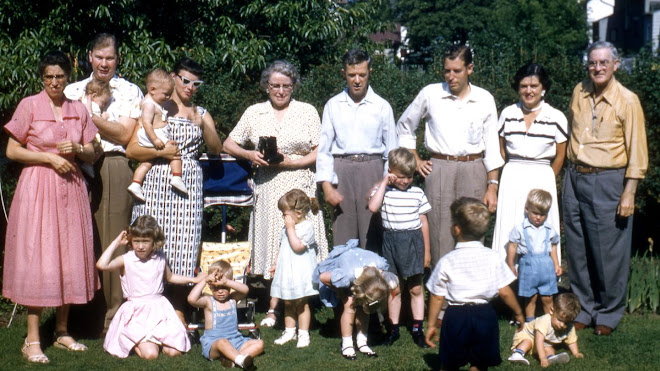Since I made a few comments about the Dem convention, I thought I'd add my two cents about the GOP convention that ended last night, for what it may matter.
The choice of Sarah Palin for VP is the biggest surprise. There's plenty to like about her, and I think voters will be drawn to her in droves. Throughout the campaigning leading up to the nominations, I thought that a Democratic win for president was inevitable. Bush & Cheney would be ousted, even though they were leaving anyway, along with the Republican party. McCain was a hero and the only palatable choice among Republicans running but he never seemed maverick enough to disengage himself from the GOP. Now my gut tells me that the GOP ticket has better than an even chance to get into the White House. It may depend on the electoral college again and a few, small swing states, like New Mexico.
The Dem convention theme seemed to be not so much Obama's stump speech about change--I still don't have any clear idea what he proposes to change but I trust that his administration really will bring about change in the country's goals and aspirations--but more to make the point that at this moment in time a Democrat, whoever he may be and whether or not you supported him during the primaries and despite any reservations you may still have about him, must be elected president to undo the course set by the past Republican administration. (A course begun with Reagan and Gingrich and the Christian right, and whatever merit the course had has since become sullied.) We cannot afford another Republican mandate. Judicial picks really do matter.
I don't think I am alone to have reservations about the Democratic ticket, despite my reluctance to re-admit Republicans into the White House. So the choice of Palin is awe inspiring.
The Republicans, in a strategy that tips its hat to Karl Rove, have adopted the Obama theme and made it their own. So now everyone is for change. (And everyone is united.) The problem I see for the Republicans is that eventually some clear voice will state the obvious. The status quo is a Republican-led course. Electing Republicans will not change the status quo. And the best these mavericks have to offer is outing Republican corruption. That's great, but it's not the substantive change I think the US needs. McCain can't convince me that he and Palin are going to end partisanship if they cannot define a middle ground. The ticket seems to be drifting further to the right. I don't believe for a second that the Republicans will bring about real change in the broad realm of energy--its source, its production, its technology, its management and consumption, its innovation, its cost, both financially and ecologically, and our commitment--which is probably our most important issue at the moment. Republicans, I fear, belatedly and reluctantly only pay lip service to any change in energy policy. Except, of course, that they're anxious to drill.
Meanwhile, the Democrats are all over themselves with God Bless the USA and red-white-and-blue spectacles. I don't think they have much to offer--I can't imagine now what they will have new to offer--to counteract the appeal of the new Republican ticket. I don't think any McCain-Obama debates will be persuasive, and Biden could lose a debate with Palin. It seems unlikely there are any skeletons that may be exposed. Most people seem to have already dismissed the daughter's pregnancy as a real issue, even though I suspect some people had (only) a second's worth of self-righteous indignation given Palin's purported conservative position. I thought it odd that when the pregnancy was disclosed, mom took pride in asserting that her daughter "chose" to keep the baby. What a strange word choice.
And in a stroke of brilliance, the real issue about Palin--her obvious inexperience--is foreclosed. Obama is bright, articulate, and on the right side of issues, but my reservation about him was always about his lack of experience.
(My second reservation was his position on Iraq. He was right from the start but he did not have to account for the politics of the decision making. We all knew at the moment it began that it was ill-considered and ill-advised. The war was motivated by arrogance and hubris, if not greed. It was orchestrated by power mongers who insist on running government as though it were a corporation or a fiefdom and they were immune from personal responsibility. Even though we knew in our heart of hearts that the war was a gross mistake and that Bush was, well, it's the sad truth, an idiot, we were also mesmerized by the shock and awe and caught up in the humvee rides in the swirling sandstorms. Given his position, Obama couldn't seem to address in practical terms the horrible situation that came about. When Democrats supported the troops, and obstensibly the war, it was because the war was a fait accompli that couldn't easily be undone without grave consequences. Although he denies it, he later backpedaled, and it's clear McCain will go after him on that. That's the point of the "I'd rather lose the election than lose the war" position.)
Dems can hardly attack Palin on the inexperience issue. We applaud both Obama and Palin for being outside "politics as usual," a sad platitude, because they are novitiates. At the same time, however, we need people who dare to work within the political system to get things done, however small or big the accomplishments may be, and who have demonstrated they are good at it. They are both vulnerable. Sure, Obama has come up to speed since he first ran, but who's to say Palin also cannot come up to speed? I guess the argument is that Obama has some experience on a national level while Palin has some experience on the administrative level. Is it a wash?
Obama has to be ready for Day 1; Palin only has to be ready for Day 2. And, my god, we've managed to survive somehow with some other clearly inexperienced, and not even very bright, elected officials. Unfortunately, Palin will be learning under the wings of Republicans. She's a hearbeat away, and McCain sometimes looks like hell. (He's been through hell, so no surprise, I guess. Yeah, he's old, but his mom looks pretty strong at 96.) And as undeniably appealing as Palin is, she's also scarily conservative. (Sorry, I personally don't think a life-time NRA membership is a credential for politics anymore, but I do appreciate the love for hunt and game she must share with most, if not all, of her fellow Alaskans.)
Palin won't attract the women who supported Clinton. She's going to attract the men and women who might have sat on the sidelines this year because now they are excited. She's going to attract the people who began to doubt their support for Republicans. She's going to attract all the regular people who really are on the front lines and in the trenches of social and economic issues.
So I saw the Republican convention. Not as much as the Dem's, but I was there in front of CSpan every night. (I did, however, play more chess with Jacson and Rylee during the telecasts on those nights.) I couldn't stomach most of the speeches. Republican friends say they liked Gulliani's speech, but I turned away after a couple of minutes. Romney and Lieberman, egads, they were horrible. Palin had a good speech, clever in places, and it showed her personality to good effect. I liked the montages and tributes to McCain, but his speech wasn't motivating. Why do so many of these speeches bog down in the middle? Do they really think we need a line itemization? There have to be better ways to accomplish that, and, frankly, they all sound so hallow. I'm so tired of the anecdotes about people they met on the campaign trail and how they're running to protect them and help them. (They all do this now.) Fred Thompson, who strikes me as a washed out actor and never a serious presidential candidate, was the best speaker.
Wow, what compelled me to write this? Maybe to look back at it later?
skip to main |
skip to sidebar






Costa Rica 2011




Aunt Dorothy, Uncle Al (holding Rick), my mother, Ginny (holding David), Grandma, Uncle Ed, Uncle Bob, Aunt Kay and Grandpa. On the lawn: cousins Mary, me (Paul), Jean, Susan, Philip, Robert, Bill and John.




Post a Message
LOOK! LOOK! Just type in your name & a message. That's it.


Blog Archive
Blog Subjects
slideshow
(39)
Ariel
(34)
baseball
(30)
photo
(26)
photoshow
(26)
trips
(23)
Kauai
(17)
NYC
(15)
video
(15)
Christmas
(14)
Santa Fe
(9)
soccer
(8)
camping
(7)
restaurant
(6)
Durango
(5)
politics
(5)
academy
(4)
computers
(2)
skateboarding
(2)
Canal Zone
(1)
art
(1)
chess
(1)
magic
(1)
opera
(1)
skiing
(1)
wine
(1)
Search This Blog
Sidebar Notes
NYC. click here for a list of blog posts on our 2011 trip and a map of places we were.
Photoshows. I've lost links to old photoshows. I'll work to restore them.
Photoshows. I've lost links to old photoshows. I'll work to restore them.
Mountain Bikers
The Boys

The Boys
Ariel & Chris

Costa Rica 2011
Ariel & Chris

Mother's Day 2007

Christmas 2008

A selection of previous slideshows:
B O t t O M o f t h e S C r o L L
5 posts popular during last 30 days
-
I'm posting some pics in a photoshow. I have not used that for some time, and I thought I should see if I still remembered how to use it...
-
Jackson, Roscoe, Rylee We drove to California in a marathon drive in Poppa's RV the day after Christmas. The boys were excit...
Bleichers circa 1958

Aunt Dorothy, Uncle Al (holding Rick), my mother, Ginny (holding David), Grandma, Uncle Ed, Uncle Bob, Aunt Kay and Grandpa. On the lawn: cousins Mary, me (Paul), Jean, Susan, Philip, Robert, Bill and John.
SOME STUFF
- Invocation by Mary Maxwell of Omaha
- Dancing at the Movies
- Big Sur Marathon tour
- Obama & basketball: the boyfriend test
- A childhood heroe & a place to take Jack & Ry
- The Story of Stuff
- Do-Re-Me "flash mob": intentional spontaneity
- An international dance
- A marriage announcement
- Central Park running trails
- A mountain biking drama
2012?





No comments:
Post a Comment